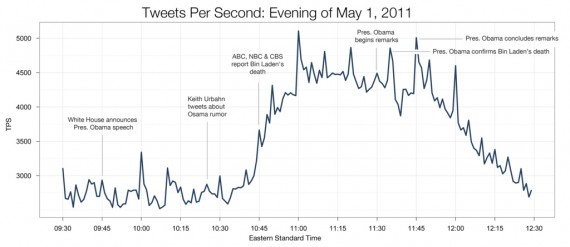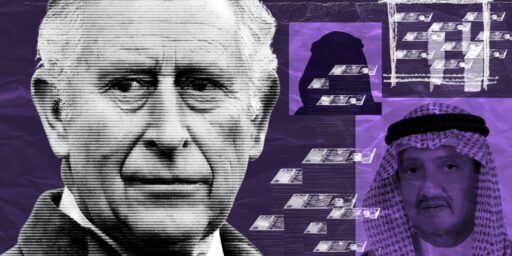Twitter As Breaking News Source
Sunday's announcement of the death of Osama bin Laden was the latest example of how Twitter has become the go-to source for "Breaking News."
When various news outlets announced around 9:45pm EDT on Sunday that the President would be addressing the nation shortly, speculation was rampant as to what it was about, but it was Twitter that had the story first:
When the White House abruptly announced an address to the nation by President Obama on Sunday night, CNN anchors spent the better part of an hour previewing the address without actually saying what it was about.
“I have my own gut instincts on what it might be,” the CNN anchor Wolf Blitzer said a couple of times, adding that a senior White House official had thanked him for showing “restraint” and not speculating.
Thanks to Twitter and Facebook, some CNN watchers had already heard the news. Unconfirmed reports — that turned out to be true — of Osama bin Laden’s demise circulated widely on social media for about 20 minutes before the anchors of the major broadcast and cable networks reported news of the raid at 10:45 p.m., about an hour before Mr. Obama’s address from the White House.
It was another example of how social media and traditional media deal with the same news in different ways and at different speeds. Just as CNN once challenged newspapers and evening newscasts with a constant stream of images from the Persian Gulf war, Twitter and Facebook have become early warning systems for breaking news — albeit not always reliable ones.
Twitter saw the highest sustained rate of posts ever, with an average of 3,440 per second from 10:45 p.m. to 12:30 a.m. Eastern time. There were more than five million mentions of Bin Laden on Facebook in the United States alone, as news of the raid at his hideout spread starting around 10:30 p.m. A new Facebook page titled “Osama bin Laden Is Dead” popped up for people to begin sharing their thoughts. It had more than 400,000 fans on Monday. (A second page, “Osama bin Laden Is Not Dead,” soon followed.)
Text messages and social networks did not only help people get and spread the news about Bin Laden’s death, but they also helped people absorb it, spurring impromptu gatherings at ground zero and outside the White House.
It left some reporters and observers trying to place the shared experience of the Bin Laden news in context. “Kennedy moment for a new generation,” wrote Alan Fisher, a correspondent for Al Jazeera English, on Twitter. “For my generation, they’ll remember 9/11 and Diana’s death. For those younger, Osama’s death will be on that scale for its global impact.”
Sam Dulik, 20, a sophomore majoring in Latin American studies at Georgetown University, was writing a paper in his dorm room when he looked at his Facebook page and saw an update from a friend, making reference to a coming announcement by Mr. Obama and speculation about Bin Laden’s death.
“It just ripped across Facebook,” said Mr. Dulik, who watched in real time as bits and pieces of the story exploded in his Facebook news feed. Then he saw calls urging students to gather at the university’s gates and head to the White House.
“For the first time ever, rather than just informing me, it spurred me into action,” said Mr. Dulik, who grabbed an American flag off his wall and headed out. “I know that this is different from what happened in Egypt. But it put me in the shoes in a very real way of whose people who use social media as a tool for political activism, for coordination and communication.”
If nothing else, it was amazing that Twitter didn’t crash during that roughly 1 1/2 hours between the announcement that the President would be speaking and when he actually spoke. At first, there was a lot of speculation about what the speech would be about that only became more prominent when the cable networks went on the air and said the White House wasn’t saying what it would be about. Theories ranged from news that Libya’s leader had in fact been killed in the strike that took out one of his sons last Saturday to thoughts that the President would be issuing a warning about an imminent terror attack. A few people predicted, accurately as it turned out, that it was news about Osama bin Laden but his name had been out of the news for so long it almost seemed implausible that this could all be about him. It was, of course, and the rest is history.
But it was via Twitter that the world was first informed that Osama bin Laden was dead:
Then, at 10:25 p.m., while Mr. Obama was writing his speech, one particular tweet seemed to confirm it. Keith Urbahn, the chief of staff for the former defense secretary Donald Rumsfeld, wrote at that time, “So I’m told by a reputable person they have killed Osama Bin Laden. Hot damn.”
Soon after that, the cable networks started reporting the news as sources in the White House, Pentagon, and Congress started confirming that report.
This wasn’t the first time that news had been broken via social media. It was via Twitter that the world saw the first pictures of U.S. Airways Flight 1549 floating in the Hudson on January 15, 2009. Social media has also played an important role in getting news out about the popular uprisings in Iran, Egypt, Libya, and elsewhere in the Arab World. These days, when it’s “Breaking News,” the first place you’re likely to find out about it is on Twitter or Facebook, even The Drudge Report doesn’t have turnaround time that moves as fast as a Retweet button.
There are dangers, of course. There have been more than a few examples of erroneous or out-of-date information being picked up by someone and sent essentially around the world before someone realizes that there’s a problem. Most recently, that happened with the NPR report that Congresswoman Gabrielle Giffords had died as a result of the shootings in Tucson, a report that was retracted within minutes by the media but which continued floating around on Twitter for at least a half hour. Nonetheless, though, we now live in a world where a news story can be broadcast to thousands, if not millions, in a matter of seconds. The fact that this leaves us with almost no time to reflect on the meaning of that story makes the information overload we’ve been experiencing ever since the dawn of cable news all the more apparent. It used to be the case that news was something you read every morning (or evening) in the local paper, now it comes at you 365/24/7. There’s no going back, of course, but I have to wonder if that’s really a good thing.






Doug, I have a suggestion for you. For your edification, cruise on over to Ace of Spades. They have a post where someone made the comparison of speeches between that given by Obama after the demise of OBL and the one Bush gave when they captured Saddam Hussein. I doubt you will do it, but let me say it is “I” opening.